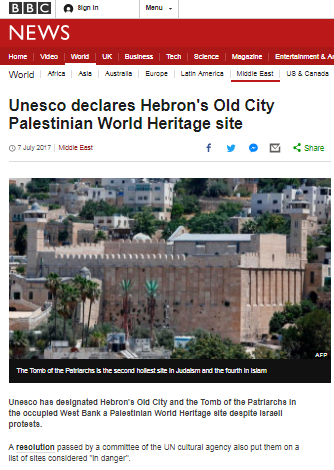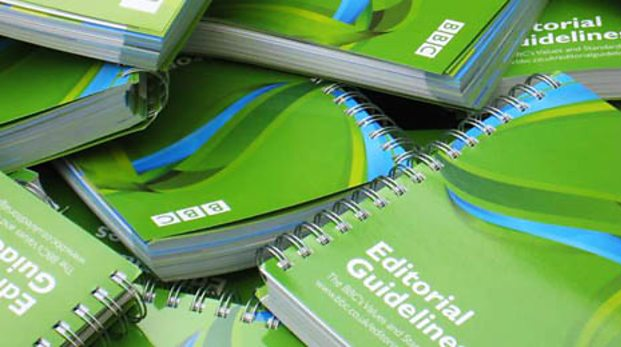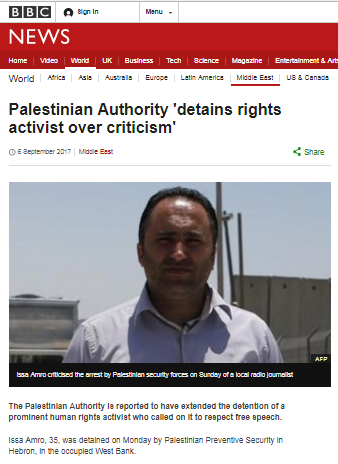As was expected, on July 7th UNESCO passed a resolution declaring the Cave of Machpelah (Tomb of the Patriarchs) an endangered ‘Palestinian’ world heritage site.
That story was the topic of a report titled “Unesco declares Hebron’s Old City Palestinian World Heritage site” that was published on the BBC News website’s Middle East page on the same day and is remarkable for what it does not tell BBC audiences.
The article fails to inform readers that the professional body – ICOMOS – that evaluated the Palestinian application did not support it and stated that “ICOMOS considers that the comparative analysis has not so far justified consideration of this property for the World Heritage List”.
“The International Council on Monuments and Sites (ICOMOS) — a professional body that investigates claims that historic sites are endangered on behalf of UNESCO — earlier rejected the Palestinian claim that the Tomb of the Patriarchs was an endangered site. Its assessment on Hebron, published on Sunday, criticized the Palestinian proposal for ignoring Jewish and Christian heritage in the city, “even though extensive remains testify to these links.””
The BBC’s report quotes a PA statement:
“Today, Palestine and the world, through Unesco, celebrate Hebron as part of world heritage, a value that transcends geography, religion, politics, and ideology,” a Palestinian foreign ministry statement said.
“This vote celebrated facts and rejected the shameless high-profile political bullying and attempts at extortion.””
Notably, that particular statement was chosen for amplification rather than other distinctly more political ones made by Palestinian parties such as a Fatah spokesman:
“Palestinian Authority President Mahmoud Abbas’s Fatah movement welcomed the vote. Fatah spokesman in Europe Jamal Nazzal said it was “historic justice” and was “another reflection of the international position which opposes Israeli policy, and of our position which rejects recognizing Jerusalem as the capital of the occupation.””
““This vote is a success for a diplomatic battle fought by Palestine on all fronts, in the face of the Israeli and American pressure on the member states … and a failure and a tremendous defeat Israel,” Palestinian Authority Foreign Minister Riyad al-Maliki said in a statement.
“Despite the aggressive Israeli campaign, spreading lies, distorting and falsifying facts about the Palestinian right, the world recognized our right to register Hebron and the Ibrahimi Mosque under Palestinian sovereignty and on the World Heritage List,” Maliki added.
“Israel’s occupation of our state does not give it sovereignty over any patch of our land in any way,” Maliki said.”
Not unrelatedly, the BBC’s report fails to inform audiences of the fact that this is far from the first time that UNESCO has been exploited for politically motivated denial of Jewish history since the Palestinian Authority joined that UN body in 2011.
That practice was specifically called out by some of the countries taking part in the July 7th UNESCO debate:
“Canada: Canada is disappointed by the continued politicization of the work of the World Heritage Committee as evidenced by this decision taken on the old city of Jerusalem and its walls earlier this week, and now by the decision to include the old town of Hebron/al-Khalil on the list of World Heritage in Danger. Canada takes issue with the decision just taken which fails to take into account the independent advisory body’s findings. Findings plainly outlined in the draft decision prepared by the Secretariat. These repeated decisions not only hurt UNESCO, they do not advance prospects for the comprehensive, just and lasting peace to which we aspire for the sake of all Israelis and Palestinians.
United States: The decision to inscribe Hebron/al-Khalil Old Town on emergency basis is divisive, confusing, and impossible to justify. This site is not under any real or immediate threat. Indeed, the only urgency here is an urgency to express political anger. Had the Committee shown patience, this inscription might have represented, at some time in the future, an example of the World Heritage Convention acting as the international community’s best and most important tool for cultural dialogue, mutual understanding and peace. Instead, the politically motivated decision today to inscribe, only further stains UNESCO’s reputation and further divides this house.
Australia: Australia regrets this decisive decision and the damaging way in which it was reached. We are concerned that this was not only harmful to Israeli and Palestinian relations but obviously damaging the World Heritage Committee and to UNESCO.
We are concerned that the heavily politicized and unbalanced language in these resolutions continue to be seen to alter the status quo of Islamic, Jewish and Christian holy sites and they are not consistent with the effort to preserve the outstanding universal values of these sites.
Australia has consistently not supported these resolutions that target Israel in multilateral forum and we do not consider that these brings both parties closer to a negotiated settlement. We are focused on supporting those initiatives which reflect and maintain progress towards a negotiated settlement so that Israel and a future Palestinian state can exist side by side in peace and security. These sorts of decisions do not advance that agenda. It furthermore fails in recognizing the advice of our advisory bodies and we encourage all sides to refrain from further provocative actions and statements that undermine prospects for peace and the interests of our organization.”
The BBC, however, elected to ignore the statements by Canada and Australia and reports only a selective version of the US representative’s comments:
“The US had argued that the Tomb of the Patriarchs was “under no immediate threat” and that adding it to the list of sites in danger “risked undermining the seriousness such an assessment by Unesco should have”.
It had also warned that the resolution might undermine efforts by US President Donald Trump to revive the Israeli-Palestinian peace process.”
The real story behind this latest UNESCO resolution is of course the continuing politicisation of that body and the hijacking of its mission for the purpose of delegitimisation of Israel through erasure of Jewish history. BBC audiences, however, are serially deprived of that crucial background information under an editorial policy that fails to comply with the corporation’s public purposes.
Related Articles:




